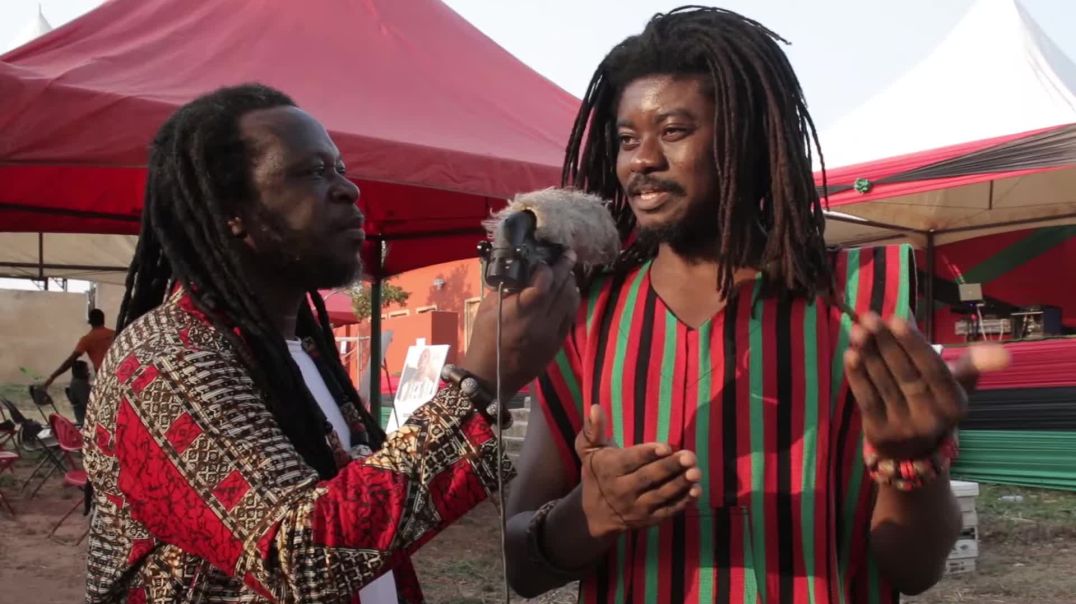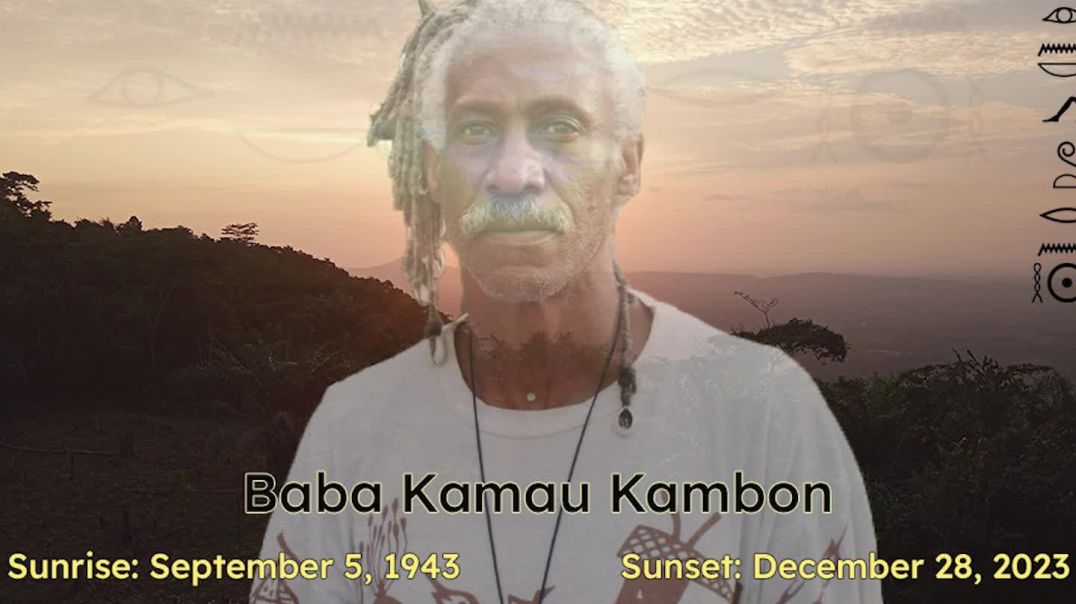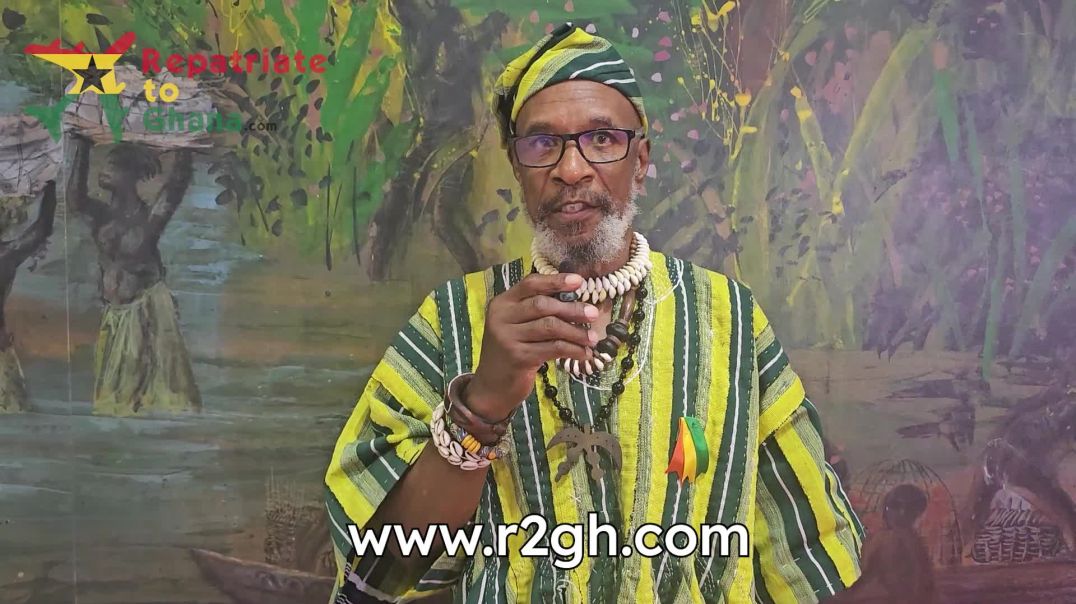Top videos
Join us on Thursday June 11th at 10AM Eastern (4PM Belgium) time as we welcome Dr. Alexis Tengan, anthropologist, to the program. Dr. Tengan is a native of Burkina Faso and member of the Dagara people of West Africa. We will discuss a variety of subject matter, including African sprituality in general, and Dagara spirituality in particular; the Dagara centers of wisdom and its wisdom tradition; the relationship of 'vitality' to healing; his journey into becoming an anthropologist and the need to write about the Dagara people from a native perspective; the bagr society; his latest book _Of Life and Health: The Language of Art and Religion in an African Medical System (2019)_; and more. This is a powerful elder with much wisdom to share to the world about a little known people in West Africa. So set your reminder, like, and share with friends and colleagues.
GET YOUR COPY TODAY!
Towards a Comparative Dictionary of CIkam and Modern African Languages (2020): http://asarimhotep.com/shop-ma....rket/books/towards-a
Aaluja Vol. II: Cyena-Ntu Religion and Philosophy (2020). : https://asarimhotep.com/shop-m....arket/books/aaluja-v
To continue to support this channel, please consider donating with Cash App:
CashApp: $asarimhotep
Visit me on Twitter: https://twitter.com/imhotep06
Visit me on Instagram: imhotep1906
My webpage: http://asarimhotep.com
Amos Wilson Speaks
FREE DOWNLOAD • THE AFRIKAN WORLD: WAR REPORT: https://kimbungamedia.com/warreport/SUPPORT GOTKUSHTV: https://www.patreon.com/kimbungamediaJoin WhatsApp: https://whatsapp.com/channel/0....029VaXt3adHwXb8Yt44J Telegram: https://t.me/kimbungamediaTHE BLACK SECRETJoin the finest Black History Course Online Learn the true histories of Africa's Great Civilisations With world renowned historian Robin Walker - author of When We Ruled100 Black History Facts - Free E-Book Share Linkhttps://www.theblacksecret.co.....uk/a/2147626266/yKro Black Secret - Website Share Linkhttps://www.theblacksecret.co.....uk/a/2147508849/yKro SUBSCRIBE • LIKE • COMMENT • SHARE•••••••••••••••••••••••••••••••••••••••••••••••••• Greetings & Welcome to Kimbunga Media - Your Premiere Universal Afrikan Nationalist Media Institution Find Kimbunga Medai on:► Instagram: http://instagram.com/kimbungamedia► https://www.facebook.com/kimbungamedia► Twitter: https://twitter.com/kimbungamedia► SignUp for Newsletter: https://kimbungamedia.com
September 2025. France's government collapses. Prime ministers ousted one after another. Protests engulf Paris. Debt spiraling past 110% of GDP. Energy prices up 40% since 2022.
The headlines blame political chaos. Budget cuts. Macron's failures.
But that's not the real story.
The real story starts in Niger. With uranium. And a $500 billion rejection that nobody saw coming.
For 80 years, France paid Niger pennies for uranium worth billions. Niger got €100 million annually—just 5% of its budget. France? They turned that uranium into $74 billion in nuclear energy exports. Built an empire on African resources while telling the world they were "partners."
When Niger finally asked for a fair deal—raising royalties from 5.5% to 12%—French executives laughed. Called them dreamers. Shut down production to pressure them into submission.
Big mistake.
Because what France didn't understand is that this generation of Africans isn't asking for permission anymore. They're not begging. They're not waiting.
Mali, Burkina Faso, Niger, Chad, Senegal—one by one, they cut the cord. Kicked out French troops. Stopped depositing reserves in Paris. Renegotiated contracts. And when France tried to hold onto Niger's uranium? Niger nationalized the mines.
The economic model that kept France wealthy for nearly a century? Gone. The cheap uranium that powered 65% of French electricity? Cut off. The financial flows that propped up French borrowing? Dried up.
And now we're watching France discover what happens when extraction ends and reality hits.
This isn't just about France and Africa. It's about every system built on exploitation. Every relationship that only works when one side doesn't know they're being used. Every empire that forgets empires fall.
In this video, I'm breaking down the numbers they don't want you to see. The predictions experts made that the media ignored. And why Germany thrives without exploiting anyone while France crumbles without Africa.
If you want to understand the real forces reshaping global power—the ones the headlines miss—you're in the right place.
Hit subscribe. This is just the beginning.
Sources in pinned comment.
#france #africa #niger #uranium #geopolitics #panafrican #cfa #economics #francecollapse #africanunity
welcome to Africa Today a place where we showcase Africa's financial potential and help you obtain financial freedom
TO JOIN OUR MEMBERSHIP CLICK THE LINK
https://www.patreon.com/AfricaTodayClub763
BOOK A SESSION WITH US THROUGH
https://www.patreon.com/AfricaTodayClub763/shop/one-on-one-consultation-129020?source=storefront
JOIN OUR MEMBERSHIP THROUGH
https://www.youtube.com/channe....l/UCQhku_T68i-szD9Qj
OUR PAYPAL
http://paypal.me/AfricaToday
Don't forget to Like, Share and Subscribe
The hidden meaning behind modern Akan funeral rites in Ghana.
Funeral rites forms an integral part with the culture of the Akan people in Ghana. Like myself, if you grew up within the Ashanti region of Ghana, chances are your parents regularly went away on funeral runs during the weekend, leaving you with numerous household chores that had to be completed by their return.
Though I spent most of my childhood wondering why I had to lose my beloved mother on weekends to funerals, I've come to realize that there are very good important reasons for these funeral rites. So in this video, I share with you some of the hidden meaning behind modern Akan funeral rites in Ghana. I say modern as most of the old traditions has been excluded or modified due to several reasons. My name is Mickey....Keep Watching!!!
Every country has a story; so does its people. I get to travel and visit different parts of the world due to the nature of my work, so I take viewers with me in the form of vlogs to explore and tell beautiful stories of the people and the places that I am working.
I am dedicated to provide deep, meaningful and entertaining contents for you, my viewers....
So enjoy!!!
Music: "Scott Buckley - Freedom" is under a Creative Commons license (CC BY 3.0) https://www.youtube.com/user/musicbys...
Music promoted by BreakingCopyright: https://bit.ly/freedom-song
Please subscribe: https://m.youtube.com/c/Mickey....Agyei?sub_confirmati
Follow me on Facebook: https://www.facebook.com/MickeyAgyeiGH
Follow me on Instagram: https://www.instagram.com/mickey_agyei/
Sotomoisture gets dissected
What if I told you that one man's vision could transform an entire nation's agriculture? What if this transformation didn't just promise food security, but also symbolized a bold move toward real independence? Ibrahim Traoré, the young and dynamic leader of Burkina Faso, is making waves with his groundbreaking initiative to bring 2,000 tractors to revolutionize his country's agricultural sector. This isn’t just about machines—it’s about empowering rural communities, tackling food insecurity, and pushing Burkina Faso, along with the broader Sahel States, toward true independence from former colonial powers like France. Agriculture is the backbone of many African economies, and it’s time for countries like Burkina Faso to stop relying on outdated farming methods and foreign imports. Ibrahim Traoré’s tractor initiative is poised to change that, giving farmers the tools they need to increase productivity and reclaim control of their land and future. Stay with me as we dive deep into how this ambitious project is unfolding and why it could be a game-changer, not just for Burkina Faso, but for the whole of Africa. Burkina Faso’s agriculture, like much of sub-Saharan Africa, has long struggled under the weight of traditional farming practices, climate change, and a lack of resources. The country’s agricultural sector still relies heavily on manual labor, with farmers working with basic tools, outdated methods, and minimal technological support.
Brand new episode of Dj Tira's party. This time we got Captain
Thank you for watching, please subscribe to support the channel.
Connect on other platforms:
Website: http://www.afrotainment.co.za/
Facebook: https://www.facebook.com/afrotvchannel/
Instagram: https://www.instagram.com/afrotainmentsa/
Twitter: https://twitter.com/afrotainmentsa/
TikTok: https://www.tiktok.com/@afrotainmentstudio?lang=en
Beatport: https://www.beatport.com/label/afrotainment/99268
Bookings: samkelo@afrotainment.co.za
#afrotainment
A lioness with a new litter of cubs was very weary of a resident male lion that was sitting close to her den. The male lion previously killed her first litter during the pride takeover, although it's highly unlikely that he would kill this new litter given that he sired the cubs, the lioness is still not taking any chances.
Filmed in Masai Mara via Naibosho conservancy
Exploring the Sorghum Value Chain in Kenya under UniBrain.
Wongel Zelalem reports on a British Troop that posted on his snap-chat account what the British troops have been doing while in Kenya.
Join Our Website For Uncensored News Reports
https://africandiasporanews.org
--------------------------------------------
Download Our New African Diaspora News Channel App
Android https://play.google.com/store/....apps/details?id=com.
iOS https://apps.apple.com/us/app/....african-diaspora-new
----------------------------------------------------
Support Us On Patreon For A Minimum Of $2 Per Month.
https://patreon.com/AfricanDiasporaNews
---------------------------------------------
Send Money Orders To
2323 Clear Lake City Blvd.
Suite 180 Box 133
Houston,Tx 77062
--------------------------
One Time Donations To Our Network
Paypal https://paypal.me/AdviseMediaNetwork
Cash App https://cash.app/$AfricanDiasporaNews
----------------------------------------------
Order My Book Passive Aggressive Racism In The System of White Supremacy
https://www.amazon.com/dp/1732887314
------------------------------------------------------------------------
Listen To The Phillip Scott Audio Experience Podcast
https://anchor.fm/advise-media-network
------------------------------------------------------
Subscribe To All Of Our YouTube Channels
https://www.youtube.com/AfricanDiasporaNewsChannel (African Diaspora News Channel)
https://www.youtube.com/c/Afri....canDiasporaNewsInsid (African Diaspora News Insider)
https://www.youtube.com/thephillipscottshow (The Phillip Scott Show)
https://youtube.com/intercontinentalfoodreview (Intercontinental Food Review)
https://www.youtube.com/channe....l/UC90CRiDvbos7k0B6k (Phillip Scott Audio Experience)
------------------------------------------------------------------------------------------
Social Media Pages
Follow us on Instagram https://www.instagram.com/africandiasporanews
Follow us on Twitter https://twitter.com/AfrDiasporaNews
Follow us on Facebook https://www.facebook.com/AfricanDiasporaNews
Follow us on Tik Tok https://tiktok.com/@africandiasporanews
---------------------------------------------------------------------
Purchase merchandise from our store
https://teespring.com/stores/a....frican-diaspora-news
What we need now us Black People is power to control everything we can. Watch different views around the globe. Come 2025 Abibitumi comes back again.
https://conference.abibitumi.com
Buju Banton Drink Champs Interview clip where Buju explains the difference between Reggae and Dancehall -- from his perspective. Context - Buju was a Dancehall artist initially, but when he converted to Rastafarai he became a Reggae artist. I will be comparing his perspective with that of his contemporary Beenie Man in an upcoming article on my discourse-oriented channel.
Kamjiverse details the history of West Afrika
Neo Colonialism and Mentacide in Haiti : How Gilbert Bigio became the richest man in Haiti preying o
African people seem to be lacking a culture. This man would not have been allowed to walk around in Jean Jacaques Dessalines Haiti.
In a troubled African village, an unusual baby is born.
In 1998, Square One released 'Faluma', spoken in the language of the Saamaka tribe in Suriname. The song went on to top the charts in almost every Caribbean territory, as well as on numerous radio stations throughout North America and Europe. Watch now as the Caribbean Queen Alison Hinds re-introduces 'Faluma,' to the world followed by her 2011 carnival release of Makelele!
Video Directed by: Tania Hoser
Edited by: Tania Hoser & Raivo Loo
©: 2012 Black Coral Inc
Explore Freetown with Vickie Remoe to meet the descendants of enslaved Africans who left the New World to return to the Colony of Freedom to create a new creolized way of life that is now over 200 years old.
Guests: Cassandra Garber, Krio Descendants Union
Tour: The Maroon Church built by Jamaicans and Nova Scotians
Creating a precious soil improver from farm waste is a pillar of production of top quality crops. Dorothy Duodu, from fruit-exporting company Blue Skies, is your guide to Ghana's way to make and use compost on a large scale.
This film, one of eleven, is being used to share good agricultural practice in Africa.
LEAF (http://www.leafuk.org), Waitrose, African fresh produce exporters and Green Shoots Productions (http://www.green-shoots.org) have been working with support of the UK Department for International Development's Food Retail Industry Challenge (FRICH) fund to share good agricultural practice between African farmers.




![White Mouthpieces ie Tommy Sotomayor]](https://d2pqtpahsfkkkc.cloudfront.net/upload/photos/2019/11/47e39bc929f222978565b9ac7ccd4eceba965318pMp28hkzRXtuVCwHiSYC.video_thumb_9722_992.66666666667.jpeg)















